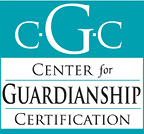National Certified Guardian (NCG)
The National Certified Guardian designation is granted to individuals who have met the minimum eligibility standards for CGC Certification including the necessary training and testing requirements. The designation must be renewed every two years as long as eligibility and continuing education requirements are met.
National Master Guardian (NMG)
National Master Guardians are expected to have a comprehensive understanding of the issues pertaining to guardianships of both the person and of the estate. The prerequisites for the National Master Guardian certification include National Certified Guardian status from the CGC, extensive professional guardianship experience, submission of a comprehensive application and passing a qualifying examination. The designation must be renewed every three years as long as eligibility and continuing education requirements are met.
